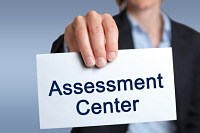Special Assignments: Assessment Centers, Brain Teasers, Case Interviews
What Is an Assessment Center?
In certain cases, candidates are invited by HR officers to an assessment center to undertake a range of various tests. Over a period of around one to three days, candidates are set different situations and exercises and are evaluated and appraised by HR officers, psychologists, and external consultants.
What Is Tested?
Factors include personality, ability to focus, resilience, organization skills, comprehension ability, leadership skills, teamwork ability, perseverance, and negotiating skills.
Structure
Typical components of a group assessment are:
- Self-presentation: A short presentation about yourself using aids of some kind (flip chart, projector, etc. ), like a letter of motivation.
- Group discussion on a general global topic or an issue arising from daily business. Either with or without leadership, role play, or a set goal.
- Case study, analysis, and resolution of a fictional company dilemma.
- Mailbox exercise: A pile of letters, internal notes and instructions, from which candidates have to decide how important something is and how urgently it needs addressing.
- Individual interview: Similar to an interview, often with unpleasant and aggressive questions.
- Tests on personality, intelligence, knowledge, or concentration.
- Role play, e.g. a critical meeting between superior and subordinate, team member discussions, sales meetings, or client meetings.
- Dinner: Eating together to test socializing skills and manners.
- Final meeting with feedback and self-assessment.
Practice
Some exercises can be practiced in advance. You will find information, advice, and plenty of examples of typical exercises in specialist literature and on the Internet.
https://www.assessment-center-kurse.de/
monster.de
www.focus.de
Brainteasers
Brainteasers are riddles that test candidates’ analytical thinking and problem-solving skills. Particularly in corporate consulting, but also in investment banking and in industry, brainteasers are increasingly being included in the course of interviews or assessments.
Why Brainteasers?
Organizations like to use these quiz questions to test candidates’ analytical and logical powers of reasoning and their intellectual creativity. HR managers also see how people react to apparently unsolvable tasks and get an impression of the candidate’s communication skills. What is important is not simply finding the right answer to the question but the way in which you get there.
Examples and Training
Example 1
You are riding a bicycle along a railroad embankment. There is a regular train service along this track connecting two cities. Every 30 minutes a train overtakes you from behind, every 20 minutes a train comes towards you. How regularly (in minutes) do the trains run?
Answer
Every 24 minutes. What happens when a cyclist rides for an hour along a railroad embankment? The cyclist is overtaken by two trains. When, after an hour, the cyclist returns with the same speed to his starting position, three trains come towards him. This means that in total five trains travel in one direction in two hours. That corresponds to one train every 24 minutes. You can also solve this brainteaser by forming an equation.
Example 2
What is the next letter: J-F-M-A-M-J?
Answer
J: January, February, March, April, May, June.
Example 3
What is more powerful than God, and more evil than the devil? The poor have it, the rich need it, and who eats it, dies.
Answer
Nothing.
Tips
- Read the brainteaser carefully, or listen attentively to the interviewer.
- Make notes.
- Pay attention to details.
- Ask if anything is unclear.
- Say your thoughts aloud and observe the interviewer’s reaction.
- Split the question into parts.
- Do not put yourself under pressure, remain calm.
- It’s the thinking process that counts.
Further Examples
Case Interview
A case interview is not a complete interview process but forms part of a (structured) interview. Overall, it is mostly consulting firms, banks, and software companies that make use of this selection process.
In a case interview, candidates analyze a realistic business case. This enables companies to test a candidate’s skills in
- Analytical and structured thinking
- Strategic thinking
- Problem solving
- Creativity
- Stress management
der Kandidatinnen und Kandidaten sind. For participants, it is important to know that there is no right solution but several sensible and feasible solutions. These interviews entail much more interaction, leading to more of a dialogue. You can and should ask questions, communicate your thoughts, and make notes.
Example of a Case Interview
“You are asked to optimize the product range strategy for Trevor’s Toys Inc. Your team should come up with an idea quickly: You have just 12 weeks (60 working days) to complete the project. You need to allocate your time well in order to develop the best possible solution for Trevor’s Toys.”
If you are interested, you can try to solve this case example using an interactive tool in the link above.
Practice
Other examples and exercises can be found on the websites of the major consulting firms, e.g.:
